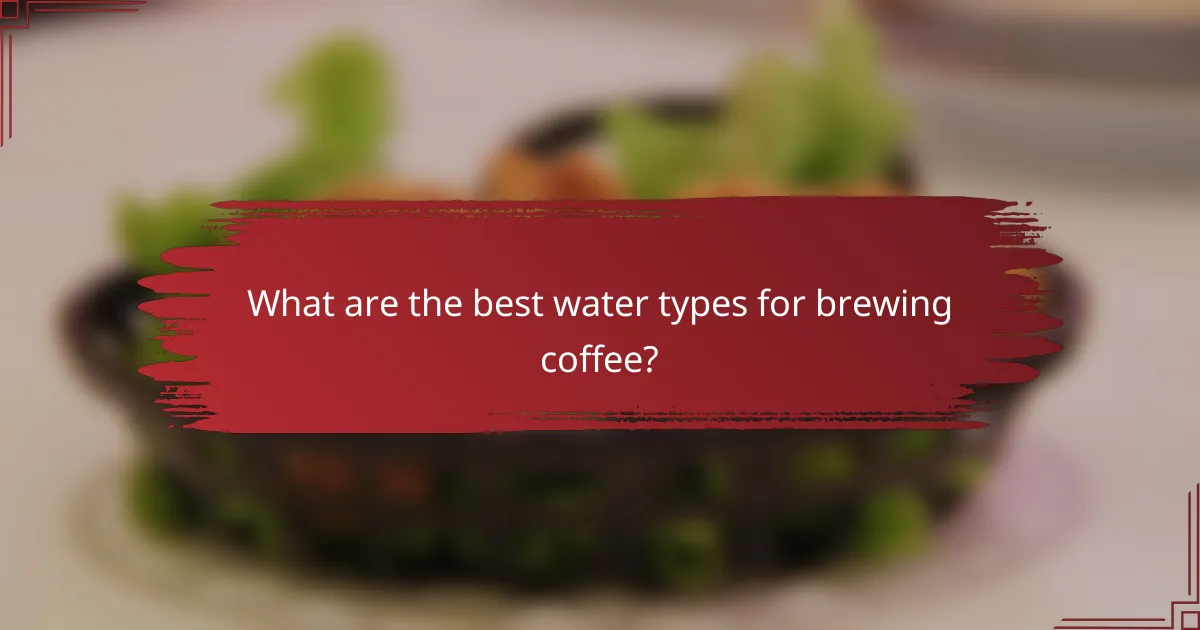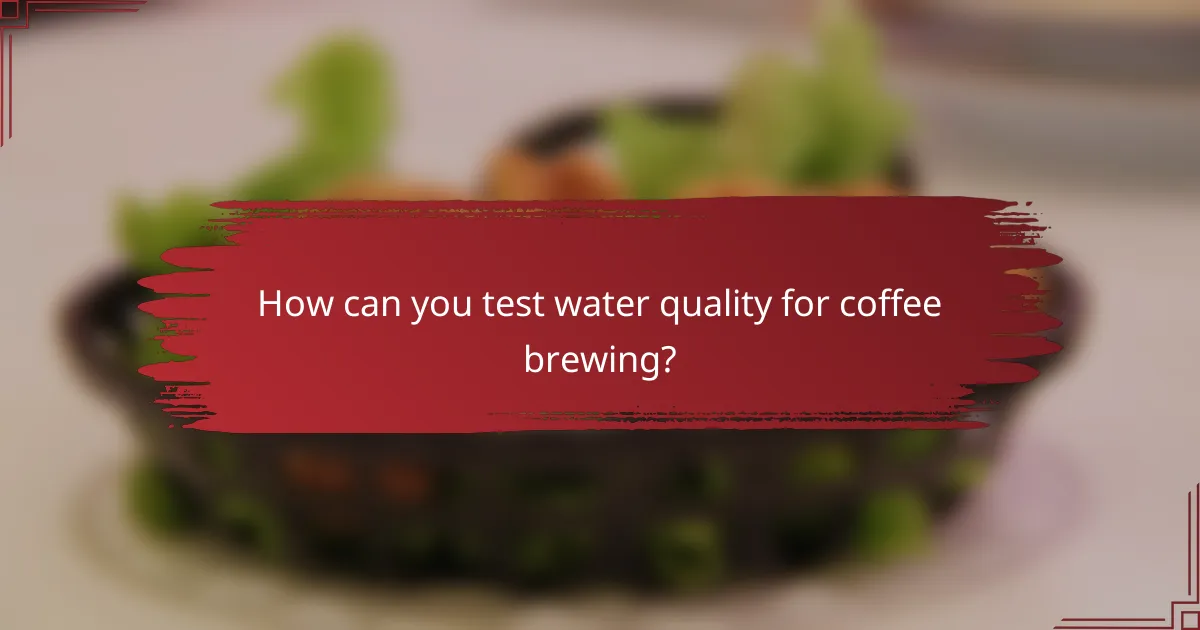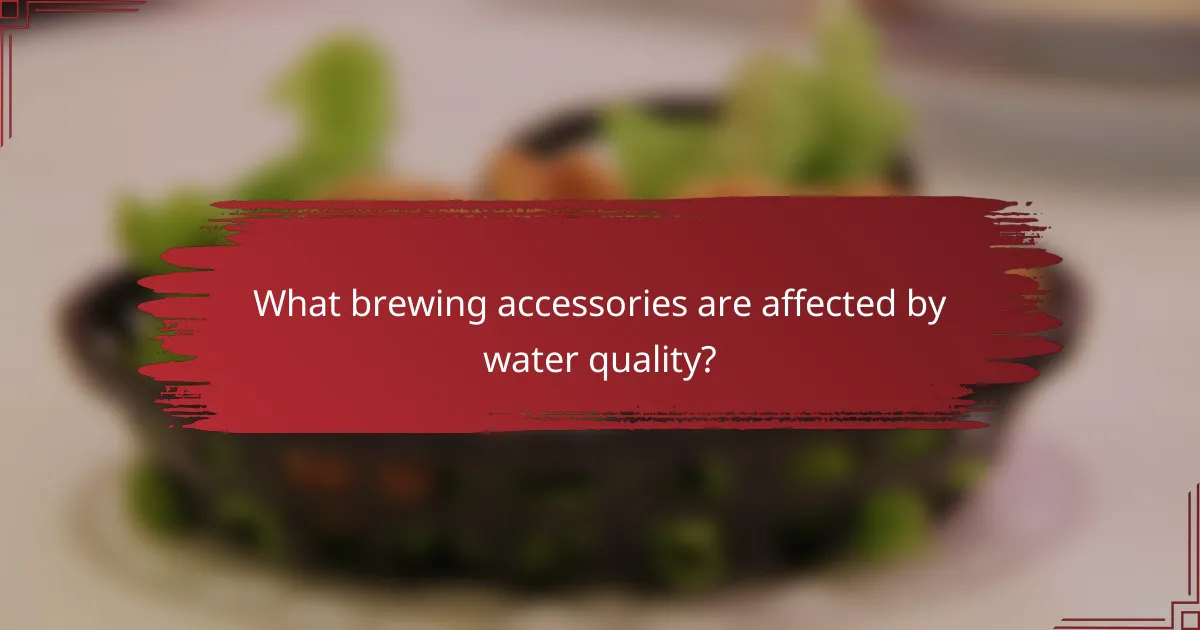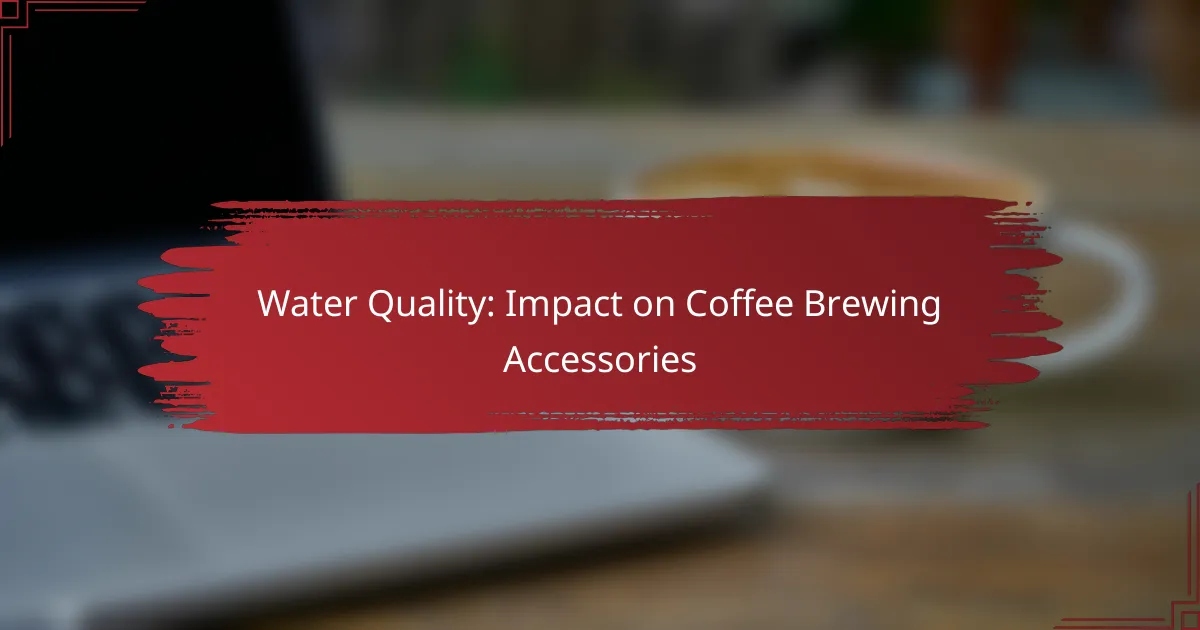Water quality plays a crucial role in the brewing process, directly impacting the flavor and aroma of coffee. Factors such as mineral content, pH levels, and impurities like chlorine can significantly alter the taste profile of your brew. Choosing the right type of water, such as filtered or spring water, is essential for achieving optimal extraction and enhancing your coffee experience.

How does water quality affect coffee flavor?
Water quality significantly influences coffee flavor by affecting the extraction of compounds during brewing. Factors such as mineral content, pH levels, and the presence of chlorine can alter the taste and aroma of your coffee.
Mineral content influences taste
The mineral composition of water plays a crucial role in determining the flavor profile of coffee. Key minerals like calcium and magnesium enhance extraction, leading to a fuller taste. Conversely, water with low mineral content can result in a flat or dull flavor.
For optimal brewing, aim for water with a total dissolved solids (TDS) level between 150-250 mg/L. This range typically provides a balanced flavor without overpowering the coffee’s natural characteristics.
pH levels impact acidity
The pH level of water affects the acidity of coffee, which is a critical component of its flavor profile. Ideally, water should have a pH between 6.5 and 7.5 to maintain a balanced acidity. Water that is too acidic or too alkaline can lead to undesirable flavors.
To ensure the best results, consider testing your water’s pH and adjusting it if necessary. You can use pH strips or a digital meter for accurate readings.
Chlorine alters aroma
Chlorine, often used in municipal water supplies for disinfection, can negatively impact the aroma of brewed coffee. Even small amounts of chlorine can impart a chemical taste and mask the coffee’s natural flavors.
To avoid this, consider using a water filter that removes chlorine or letting tap water sit for a few hours to allow chlorine to dissipate before brewing. This simple step can significantly enhance the overall coffee experience.

What are the best water types for brewing coffee?
The best water types for brewing coffee include filtered water, spring water, and, to a lesser extent, distilled water. Each type affects the flavor and quality of the brew differently, making it essential to choose the right one for optimal results.
Filtered water enhances flavor
Filtered water is often considered the best choice for brewing coffee as it removes impurities and chlorine, which can negatively impact taste. By using a good filtration system, you can achieve clean, crisp water that allows the coffee’s natural flavors to shine.
When selecting a filter, look for options that reduce sediment and contaminants while retaining essential minerals. This balance is crucial for achieving a well-rounded cup of coffee.
Spring water provides balanced minerals
Spring water contains naturally occurring minerals that can enhance the flavor profile of coffee. The mineral content in spring water, such as calcium and magnesium, contributes to a smoother taste and better extraction of coffee oils.
When choosing spring water, check the label for mineral content. Ideally, look for water with a balanced mineral composition, as this can significantly improve the brewing process and overall flavor.
Distilled water lacks essential minerals
Distilled water is purified through boiling and condensation, removing most minerals and impurities. While it is free from contaminants, using distilled water for coffee brewing can lead to a flat taste due to the absence of essential minerals.
For those who prefer distilled water, consider adding a small amount of mineral-rich water or a mineral supplement to restore some flavor. This can help achieve a more balanced cup without compromising the purity of the water.

How can you test water quality for coffee brewing?
Testing water quality for coffee brewing is essential to ensure optimal flavor and extraction. You can assess water quality through various methods, including using testing strips, conducting taste tests, and sending samples to a lab for detailed analysis.
Use water testing strips
Water testing strips are a convenient way to evaluate the quality of your brewing water. These strips can measure parameters such as pH, hardness, and chlorine levels, which directly affect coffee flavor. Simply dip the strip into a sample of your water and compare the color change to the provided scale.
When using testing strips, look for those that cover a range of important factors. For coffee, a pH between 6.5 and 7.5 is generally ideal, while hardness levels around 50-150 mg/L can enhance extraction. Regular testing helps maintain consistent water quality.
Conduct a taste test
A taste test is a straightforward method to evaluate water quality’s impact on coffee flavor. Brew a cup of coffee using different water sources and compare the taste. Pay attention to factors like bitterness, acidity, and overall balance.
To conduct a proper taste test, use the same coffee beans and brewing method for each sample. This will help isolate the variable of water quality. If one source consistently produces better coffee, consider using that water for your brewing needs.
Check for contaminants with a lab
For a comprehensive analysis of water quality, sending samples to a lab can identify specific contaminants and mineral content. Labs can test for heavy metals, bacteria, and other harmful substances that may affect both health and coffee flavor.
When choosing a lab, look for one that complies with local regulations and offers detailed reports on water quality. This method may be more costly than other testing options, but it provides valuable insights, especially if you suspect serious contamination issues.

What brewing accessories are affected by water quality?
Water quality significantly impacts various coffee brewing accessories, influencing both the flavor of the coffee and the longevity of the equipment. Key accessories such as coffee makers, water filters, and pour-over devices are particularly sensitive to the minerals and impurities found in water.
Coffee makers require regular descaling
Coffee makers often accumulate mineral deposits from hard water, which can affect performance and taste. Regular descaling is essential to remove these buildups, typically every one to three months, depending on water hardness.
Using a descaling solution or a mixture of vinegar and water can effectively clean the internal components. Neglecting this maintenance can lead to slower brewing times and a less enjoyable coffee experience.
Water filters improve brewing results
Water filters play a crucial role in enhancing the quality of water used in coffee brewing. They can remove chlorine, sediment, and other impurities that negatively impact flavor.
Investing in a good water filter can elevate your coffee’s taste, making it smoother and more balanced. Look for filters that reduce hardness and are compatible with your brewing system for optimal results.
Pour-over equipment benefits from clean water
Pour-over coffee makers are particularly sensitive to water quality, as the brewing process relies on the water’s ability to extract flavors effectively. Using clean, filtered water can significantly enhance the extraction process, resulting in a more flavorful cup.
It’s advisable to use water with a balanced mineral content, ideally between 50-150 ppm (parts per million), to achieve the best results. Regularly changing the water and ensuring it is free from impurities will help maintain the quality of your pour-over coffee.

How to choose the right water filter for coffee?
Choosing the right water filter for coffee involves understanding the type of filter, its compatibility with your brewing system, and its overall effectiveness in improving water quality. A suitable filter can enhance the flavor of your coffee while reducing impurities that may affect taste.
Consider filter type and compatibility
Different types of water filters include activated carbon, reverse osmosis, and ceramic filters. Each type has its strengths; for instance, activated carbon filters are effective at removing chlorine and odors, while reverse osmosis systems can eliminate a broader range of contaminants.
Ensure that the filter you choose is compatible with your coffee brewing equipment. Some machines have specific filter requirements, so check the manufacturer’s guidelines to avoid issues.
Evaluate filtration capacity
Filtration capacity refers to how much water a filter can process before needing replacement. Many filters can handle anywhere from a few hundred to several thousand liters, depending on the model and type. Regularly replacing filters is crucial to maintain water quality and flavor.
Consider your coffee consumption habits when evaluating filtration capacity. If you brew coffee daily, opt for a filter with a higher capacity to avoid frequent replacements and ensure consistent water quality.
Assess cost-effectiveness
Cost-effectiveness involves comparing the price of the filter with its lifespan and performance. While some filters may have a lower upfront cost, they might require more frequent replacements, leading to higher long-term expenses.
Look for filters that offer a balance between initial cost and durability. Reading reviews and checking for certifications can help identify filters that provide good value without compromising water quality.

What are the common water quality issues in major cities?
Major cities often face specific water quality issues that can impact coffee brewing. Hardness, chlorine levels, and contaminants are prevalent and can affect the taste and quality of brewed coffee.
Hard water prevalence in Los Angeles
Los Angeles is known for its hard water, which contains high levels of calcium and magnesium. This can lead to scale buildup in coffee machines, affecting their efficiency and longevity.
To mitigate hard water issues, consider using water softeners or filtration systems designed to reduce mineral content. Regular descaling of brewing equipment is also recommended to maintain optimal performance.
Chlorinated water in New York
New York’s water supply is treated with chlorine to eliminate pathogens, which can impart a chemical taste to coffee. While the city boasts some of the best tap water in the U.S., the chlorine levels can still be noticeable.
Using a carbon filter can help remove chlorine and improve the flavor of your coffee. Alternatively, allowing tap water to sit for a few hours can help dissipate some of the chlorine before brewing.
Contaminants in Chicago water supply
Chicago’s water supply may contain various contaminants, including lead and industrial pollutants, due to aging infrastructure. These substances can negatively impact health and the taste of coffee.
To ensure safe brewing, consider using a comprehensive water filtration system that targets specific contaminants. Regular testing of water quality can also help identify issues and inform necessary adjustments to your brewing process.



